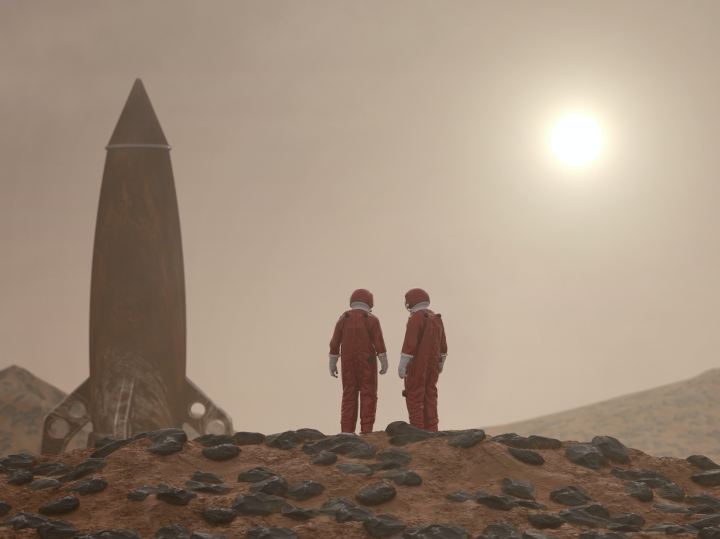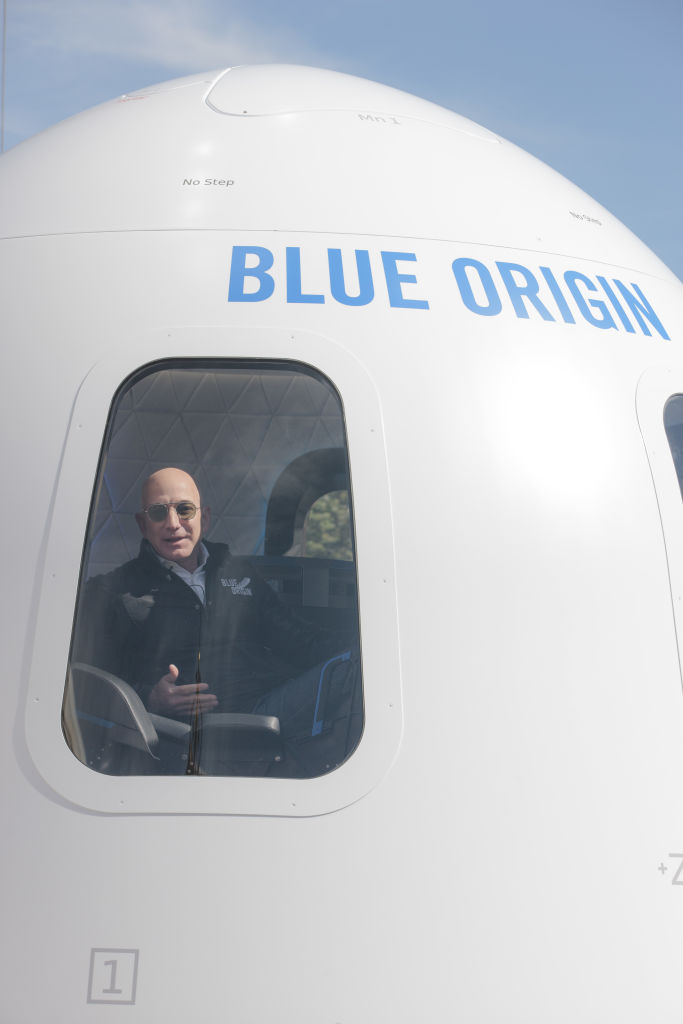THE CONVERSATION
If the world were coming to an end, what would be the most ethical way to rebuild humanity ‘off planet’?

Climate change and the nuclear threat are raising concerns about our planet’s future ability to support human life. If we launch a species survival mission, who should go?
Last week, scientists announced that for the first time on record, Antarctic ice has failed to “substantially recover” over winter, in a “once in 7.5-million-year event”. Climate change is the most likely culprit. Petra Heil, a sea ice physicist from the Australian Antarctic Division, told the ABC it could tip the world into a new state. “That would be quite concerning to the sustainability of human conditions on Earth, I suspect.”
And in March, a senior United Nations disarmament official told the Security Council the risk of nuclear weapons being used today is higher than at any time since the end of the Cold War. Both warnings speak to concerns about Earth’s security. Will our planet be able to support human life in the future? And if not, will humanity have another chance at survival in space?
‘Billionauts’ and how to choose who goes
Over the past few years, we’ve witnessed the rise of the “billionaut”. The ultra-wealthy are engaged in a private space race costing billions of dollars, while regular citizens often condemn the wasted resources and contribution to global carbon emissions.
Space – described in the Outer Space Treaty as being the “province of all mankind” – risks instead becoming the playground of the elite few, as they try to escape the consequences of environmental destruction. But if we have to select humans to send into space for a species survival mission, how do we choose who gets to go?
In Montreal last month, the Interstellar Research Group explored the question: how would you select a crew for the first interstellar mission? A panel led by Erika Nesvold, a co-editor of the new book Reclaiming Space, discussed the perspectives of gender minorities, people with disabilities and First Nations groups regarding the ideal composition for an off-world crew. I was on the panel to discuss my contribution to the book, which explores how we can promote procreation in our new off-world society, without diminishing the reproductive liberty of survivors.
The ultra-wealthy and reproductive slavery
The first step in deciding how to allocate limited spaces on our “lifeboat” is identifying and rejecting options that are practically or ethically unacceptable. The first option I rejected was a user-pay system, whereby the wealthy can purchase a seat on the lifeboat. A 2022 Oxfam report showed the investments of just 125 billionaires collectively contribute 393 million tonnes of carbon dioxide equivalent per year: a million times more than the average for most global citizens. If the ultra-wealthy are the only ones to survive an environmental apocalypse, there’s a risk they would just create another one, on another planet. This would undermine the species’ survival project.

Jeff Bezos, chief executive officer of Amazon.com Inc. and founder of Blue Origin LLC, sits inside the high fidelity crew capsule mock-up of the Blue Origin New Shepard system during the Space Symposium in Colorado Springs, Colorado, U.S., on Wednesday, April 5, 2017. Photographer: Matthew Staver/Bloomberg via Getty Images
The second option I rejected was allowing a reproductive slave class to develop, with some survivors compelled to populate the new community. This would disproportionately impact cis-gender women of reproductive capacity, demanding their gestational labour in exchange for a chance at survival.
Neither a user-pay system nor reproductive slave labour would achieve the goal of “saving humanity” in any meaningful way. Many would argue preserving human values – including equality, reproductive liberty, and respect for diversity – is more important than saving human biology. If we lose what makes us unique as a species, that would be a kind of extinction anyway. But if we want humanity to survive, we still need to build our population in our new home. So what other options do we have?
Reproduction and diversity
How can we avoid discrimination based on reproductive capacity – including age, sexuality, fertility status or personal preference? We could avoid any questions about family planning when selecting our crew. This would align with equal opportunity policies in other areas, like employment. But we would then have to hope enough candidates selected on other merits happen to be willing and able to procreate.
Alternatively, we could reserve a certain number of places for those who agree to contribute to population growth. Fertility would then become an inherent job requirement. This might be similar to taking on a role as a surrogate, in which reproductive capacity is essential. But what if, after accepting such a position on the mission, someone changed their mind about wanting children? Would they be expected to provide some sort of compensation? Would they be vulnerable to retaliation?
The more we focus on procreation, the less diversity we will preserve in the species as a whole – especially if we deliberately select against diverse sexualities, disabilities and older people. A lack of diversity would also threaten the long-term viability of the new society. For example, even if we exclude all physiologically or socially infertile people from the initial crew, these traits will reappear in future generations. The difference is: these children would be born into a less accepting community. Cooperation will be essential for the new human society – so promoting hostility would be counterproductive.
So, what options are left? Using a random global sample to select travellers might alleviate concerns about equity and fairness. But the ability of a random sample to maximise our survival as a species would depend on how large the sample can be. A global sample would minimise bias. But there’s a risk it might yield a crew without doctors, engineers, farmers or other essential personnel.
Random selection versus a points-based system
The best balance between competing needs might be a stratified random sampling method, involving randomly selecting survivors from predetermined categories. Reproductive potential might be one category. Others might focus on other elements of practical usefulness or contribution to human diversity.
Another option is a points-based system, whereby different skills and characteristics are ranked in terms of their desirability. In this system, an elderly person who speaks multiple languages may score higher than a physiologically fertile young person, due to their ability to substantially contribute to language preservation and education.
This does not eliminate the potential for discrimination, of course. Someone would need to decide which traits are most desirable and valuable to the new human society. However we determine our lifeboat candidates, it should be carefully considered. In our attempt to “save humanity”, we must avoid sacrificing the very things that make us human. DM
This story was first published on The Conversation.
Evie Kendal is a Senior lecturer of health promotion at Swinburne University of Technology.



















 Become an Insider
Become an Insider
Why does one have to use the term ” cis-gender women of reproductive capacity” – I stopped reading at that point ! Why not just say “women” ?? I am not aware of any other variant of our species being able to have children.
The academic world is going mad.
Sadly, as an academic, I have to agree with you Alan. This is a ludicrous article describing a ridiculous exercise no doubt funded by taxpayers. People will survive on earth even if the temperature gets 10 degrees C hotter – the survivors will live happily in northern Canada, Russia, and probably Antarctica. It is the destruction of the rest of the natural world that concerns me, caused by ever increasing human numbers and ever increasing human impact.
Hogwash can be dressed with caviar,the core is still hogwash